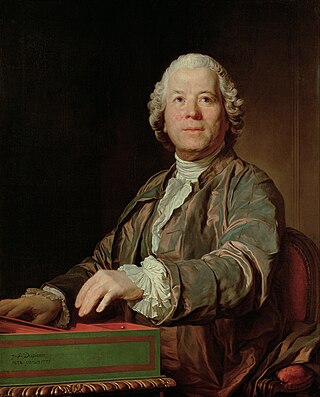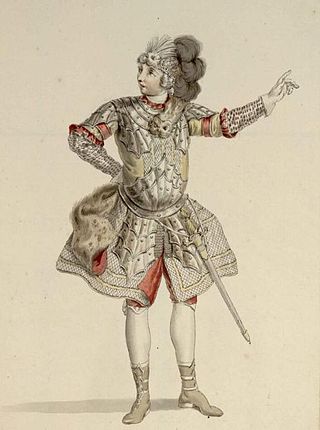Related Research Articles

Christoph WillibaldGluck was a composer of Italian and French opera in the early classical period. Born in the Upper Palatinate and raised in Bohemia, both part of the Holy Roman Empire, he gained prominence at the Habsburg court at Vienna. There he brought about the practical reform of opera's dramaturgical practices for which many intellectuals had been campaigning. With a series of radical new works in the 1760s, among them Orfeo ed Euridice and Alceste, he broke the stranglehold that Metastasian opera seria had enjoyed for much of the century. Gluck introduced more drama by using orchestral recitative and cutting the usually long da capo aria. His later operas have half the length of a typical baroque opera. Future composers like Mozart, Schubert, Berlioz and Wagner revered Gluck.

Pietro Antonio Domenico Trapassi, better known by his pseudonym of Pietro Metastasio, was an Italian poet and librettist, considered the most important writer of opera seria libretti.

Orfeo ed Euridice is an opera composed by Christoph Willibald Gluck, based on the myth of Orpheus and set to a libretto by Ranieri de' Calzabigi. It belongs to the genre of the azione teatrale, meaning an opera on a mythological subject with choruses and dancing. The piece was first performed at the Burgtheater in Vienna on 5 October 1762, in the presence of Empress Maria Theresa. Orfeo ed Euridice is the first of Gluck's "reform" operas, in which he attempted to replace the abstruse plots and overly complex music of opera seria with a "noble simplicity" in both the music and the drama.

Alceste, Wq. 37, is an opera by Christoph Willibald Gluck from 1767. The libretto was written by Ranieri de' Calzabigi and based on the play Alcestis by Euripides. The premiere took place on 26 December 1767 at the Burgtheater in Vienna.

Max Emanuel Cenčić is a Croatian countertenor, as of 1994 based in Austria. He was a member of the Wiener Sängerknaben.

Ezio is an opera seria by George Frideric Handel to a libretto by Metastasio. Metastasio's libretto was partly inspired by Jean Racine's play Britannicus. The same libretto had already been set by many other composers, first of all Nicola Porpora who managed to preempt the official Rome premiere of Pietro Auletta's setting for 26 December 1728 with his own version for Venice on 20 November, a month earlier. The libretto continued to be set and reset for another 50 years, including two versions of Ezio by Gluck. Handel's Ezio is considered one of the purest examples of opera seria with its absence of vocal ensembles.
Ezio is an Italian masculine name, originating from the Latin name Aetius.

Caterina Gabrielli, born Caterina Fatta, was an Italian coloratura singer. She was the most important soprano of her age. A woman of great personal charm and dynamism, Charles Burney referred to her as "the most intelligent and best-bred virtuosa" that he had ever encountered. The excellence of her vocal artistry is reflected in the fact that she was able to secure long-term engagements in three of the most prestigious operatic centers in her day outside of Italy.
Ezio is an opera eroica or "heroic" opera in 3 acts by Gaetano Latilla. The opera uses an Italian-language libretto by Pietro Metastasio. Metastasio's libretto was partly inspired by Jean Racine's play Britannicus and had earlier been set to music by George Frideric Handel in 1732. The work's protagonist is the fifth-century AD Roman general Flavius Aetius, returned from his victory over Attila. Latilla's version premiered at the Teatro di San Carlo in Naples on 10 July 1758. The composer both directed and conducted the production and Vincenzo Re designed the sets used in the premiere. The cast included Giovanni Carestini in the title role, Caterina Gabrielli as Fulvia, Maddalena Galli as Onoria, Caterina Galli as Valentiniano III, Gregorio Babbi as Massimo, and Antonio Ambrogi as Varo.

Il trionfo di Clelia is an 18th-century Italian opera in three acts by the Czech composer Josef Mysliveček composed to a libretto by the Italian poet Metastasio. It was common in the 1760s for composers to set Metastasian texts written decades before. Exceptionally, the text for Il trionfo di Clelia, first produced in Vienna in 1762, was almost new when Mysliveček was commissioned to compose his setting for Turin, and all of the aria texts used for his setting derive from the original libretto. This opera belong to the serious type in Italian language referred to as opera seria.

Ezio is an eighteenth-century Italian opera in 3 acts by the Czech composer Josef Mysliveček. It was the composer's first setting of a libretto by the Italian poet Metastasio that was first performed with music by Pietro Auletta in 1728, one of the most popular of the Metastasian librettos in Mysliveček's day. The story is based on incidents from the lives of the 5th-century Roman emperor Valentinian III and his general Aetius. For a performance in the 1770s, it would only be expected that a libretto of such age would be abbreviated and altered to suit contemporary operatic taste. The cuts and changes in the text made for the 1775 performance of Mysliveček's opera are not attributable. All of Mysliveček's operas are of the serious type in Italian language referred to as opera seria.

Ezio is an eighteenth-century Italian opera in 3 acts by the Czech composer Josef Mysliveček. It was the composer's second setting of a libretto by the Italian poet Metastasio that was first performed in 1728, one of the most popular of the Metastasian librettos in Mysliveček's day. The story is based on incidents from the lives of the 5th-century Roman emperor Valentinian III and his general Aetius. For a performance in the 1770s, it would only be expected that a libretto of such age would be abbreviated and altered to suit contemporary operatic taste. The cuts and changes in the text made for the 1777 performance of Mysliveček's opera are not attributable. All of Mysliveček's operas are of the serious type in Italian language referred to as opera seria.
Ezio is an opera libretto by Pietro Metastasio, first officially set to music by Pietro Auletta and premièred in the Teatro delle Dame, Rome, on December 26, 1728; an unauthorized setting by Nicola Porpora had already been premièred a month earlier in Venice.
Il trionfo di Clelia, Wq. 31, is an opera composed by Christoph Willibald Gluck. It takes the form of a dramma per musica in three acts. The Italian-language libretto by Pietro Metastasio is based on several semi-legendary narratives concerning the founding of the Roman Republic. The opera premiered on 14 May 1763 at the Teatro Comunale di Bologna. Although rarely performed since then, it was revived in London in 2012 at the Royal Opera House's Linbury Studio.

Giovanni Ambrogio Migliavacca was an Italian poet and librettist. A student and protégé of Metastasio, he was primarily active in the court theaters of Dresden and Vienna. His most successful work was the libretto for the opera Solimano, first set by Johann Adolph Hasse in 1753 and subsequently set by 18 other composers in the course of the next 50 years.

Giuseppe Belli, also Giovanni Belli, also known as 'Il Cortoncino' was an Italian castrato-soprano singer at the Saxon court.
Hanspeter Bennwitz in Dresden is a German musicologist.

Valer Barna-Săbăduș, also Valer Sabadus, is a Romanian-German countertenor. He sings in both the alto and soprano range.
Randall Scotting is an American countertenor performing internationally at opera houses and concert venues. As a young singer, he made his American stage debut performing the role of Nireno in Handel's Giulio Cesare at Opera Colorado. Randall's first leading role in an opera was singing Oberon in Britten's A Midsummer Night's Dream in New York as part of the Juilliard Opera Center. The next year he made his European stage debut performing the role of Teseo in Vivaldi's Ercole sul Termodonte at the Festival dei Due Mondi in Spoleto, Italy. In December 2019, Scotting made his Royal Opera House Covent Garden mainstage debut in London performing the role of Apollo in a production of Britten's Death in Venice In May 2022, Scotting made his Bayerische Staatsoper debut in Munich performing the role of Michael in a production of Haas's micro-tonal opera Thomas. On 2 September 2022, Scotting's debut solo album with the Orchestra of the Age of Enlightenment, The Crown: Heroic Arias for Senesino was released by Signum Classics.
References
- Notes
- ↑ "Con che soavità: studies in Italian opera, song, and dance, 1580–1740", Iain Fenlon, Tim Carter, Nigel Fortune p. 269
- ↑ Howard, p. 98
- ↑ Buschmeier, "Gluck in Wien" (item 81), pp. 85-88
- ↑ "Christoph Willibald Gluck EZIO" (PDF). Parnassus Arts Productions. Archived from the original (PDF) on 2020-07-20.
- Sources
- Buschmeier, Gabriele, Ezio in Prag und Wien: Bemerkungen zu den beiden Fassungen von Glucks Ezio. 2003. Compares the versions of Ezio given in Prague in 1749 and Vienna in 1763
- Howard, Patricia, Christoph Willibald Gluck: a guide to research, New York: Garland Publishing, Inc., 1987 ISBN 9780824084516
- "Christoph Willibald Gluck's 'Ezio'". Lobkowicz. Archived from the original on 2015-04-15.